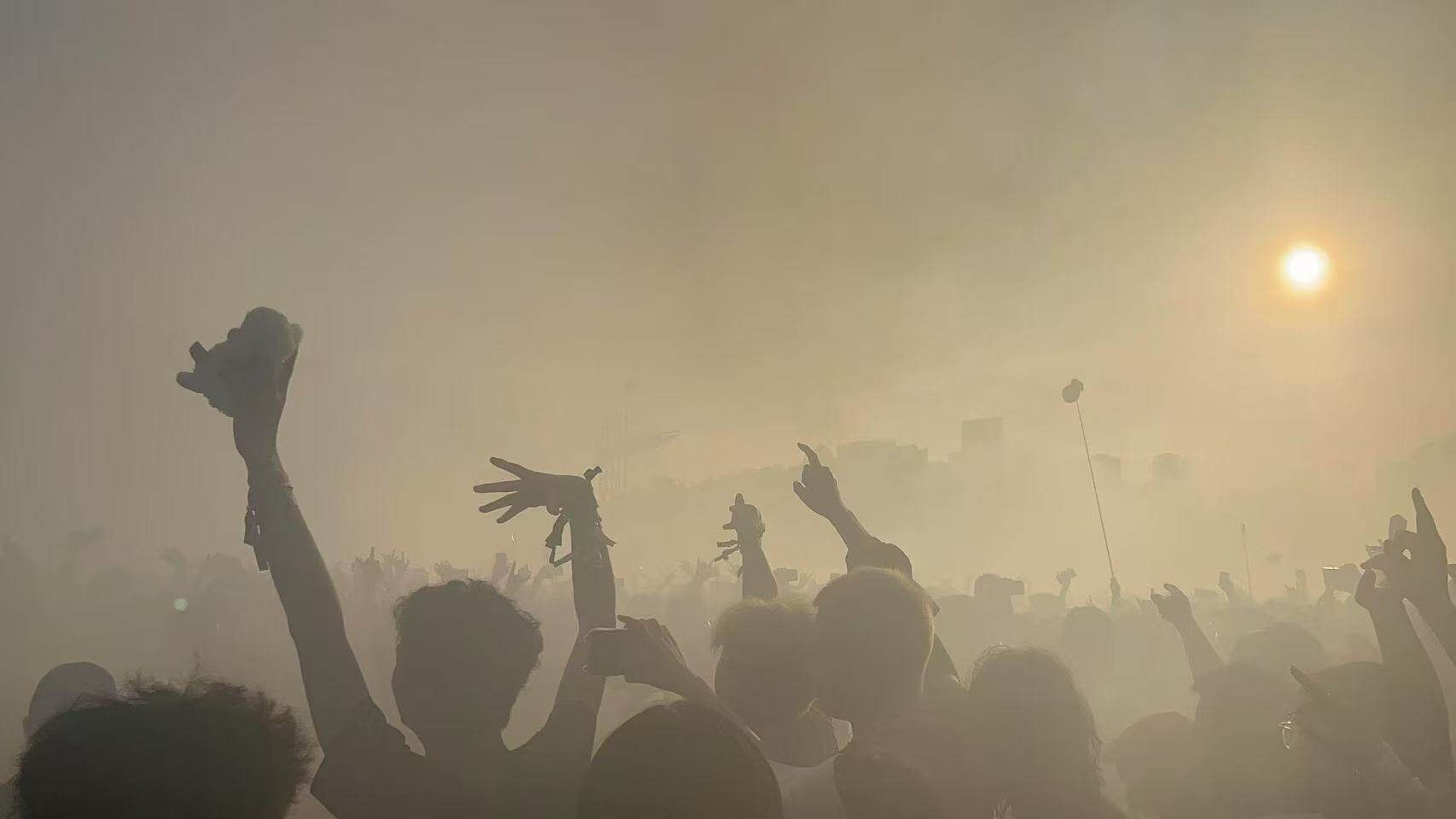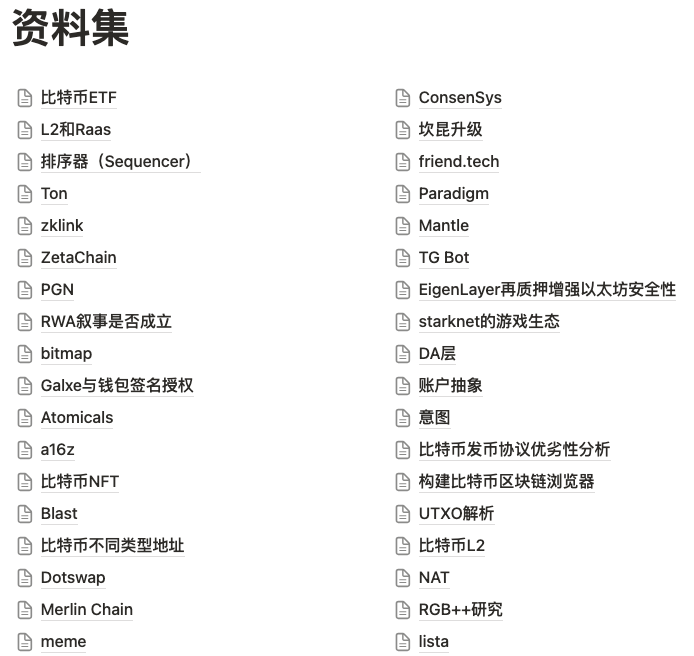Original | Odaily Planet Daily (@OdailyChina)
“I don’t want to work anymore,” I said to the meeting screen, disheveled and with hollow eyes (this time the camera was off, so they couldn’t see my appearance). After I said this, the atmosphere in the meeting froze for two seconds, and then the editor-in-chief's voice broke the silence: “Golem, stay after the meeting.”
Fortunately, the editor-in-chief was genuinely addressing my issue, not me as a problem. After several exchanges (mainly asking what I like to do), we reached a consensus: I needed to get out, change my environment. So, I went to Guiyang for a music festival and then spent a week in Kunming.

Rock enthusiasts from all over the country revel at the music festival
Web 3 is no longer my ideal
This low-energy and confused state is not new to me; since 2025, I have felt this emotion permeate my being multiple times. Many friends are concerned whether it’s because of my job, after all, no one is happy being a workhorse.
Those who say this clearly do not understand Web 3. Our industry should be the one with the least office culture—higher salary levels than peers, the freedom of remote work, flexible working hours, no clocking in or out, and an open and flat management structure. Any of these benefits, in today’s competitive job market, is a significant advantage over peers.
If we divide the workplace generations by five years, in today’s world where those born after 2005 are starting to shine in the Web 3 workplace, I, born in 2002, can be considered one of the first “00s” Web 3 workers. Although these workplace benefits have not changed, Web 3 is no longer my ideal.
I started to engage with Web 3 in school in 2021 and formally began systematic learning of Web 3 industry knowledge in 2023, entering the workforce as an intern. In my impression, this industry should be the one with the most idealists. I entered Web 3 filled with love for blockchain and decentralization, believing this industry could transform our world for the better. Data ownership, personal privacy protection, trustless currency, decentralized finance, open and transparent Web 3… I was ready to fight for my ideals and the career in my heart.
However, reality tells me that this industry only looks at “money.” “I may have been too idealistic and superficial in my understanding of Web 3 and blockchain; I hope to gain a deeper understanding in the new year,” I expressed this expectation to my boss at the end of 2024 when he asked about my plans for 2025, just half a year after graduation.
As a journalist, I am certainly a good observer and learner of Web 3. We input vast amounts of raw, first-hand industry information daily, organize and process it, and then output it to the market. My originally positive perception of Web 3 is also being reshaped. What have we experienced from 2024 to 2025? No one truly cares about technological value anymore; no one talks about ideals, all eyes are fixed on “money.”
In the first half of 2024, we began to deconstruct VCs and project parties, unlocking low-priced chips to crash the market, creating false data through airdrops, and adopting a “launching tokens is the endpoint” strategy. We realized that beneath the tech narratives packaged by VCs, “money” is the goal; later, the Meme season erupted, with players harboring ulterior motives using decentralization and shared ideals as banners to build communities. Third-rate developers were elevated under the adoration of “AI Agent saints,” and outside celebrities were ceremoniously “welcomed” when launching tokens, ultimately leading to the outcome of launching tokens → FOMO → abandoning the community/project; “money” remains the goal. As liquidity was about to be drained, savvy crypto enthusiasts turned their gaze to the stock market, using shell companies and establishing listed companies as means to seek “new money,” while what these companies do remains unimportant.
Thus, my understanding of Web 3 shifted from “this is an industry that can make the world better” to “this is merely an industry that can generate money relatively quickly,” and I too began to look at “money.”
Although I continue to follow industry trends and intensively research new projects and directions, my personal Twitter has not updated crypto-related content for a long time. Fans occasionally message me asking why I no longer publicly share projects (thank you for your recognition), and my reason is that aside from speculation, there are no projects that genuinely pique my interest, leading to a loss of desire to share.
"Golem, what you need is stimulation, even in work," the deputy editor said to me. This made me nostalgic for the time in 2023 when I officially entered the circle as an intern writing research reports at a major company. Back then, I was immersed in obsession and excitement about Web 3 every day. I would chase my mentor to discuss how cross-chain bridges achieve asset transfers between two chains, what blockchain ethical issues the monopoly of L2 sequencers would bring, and I would ride my bike along the banks of the Binjiang River in Hangzhou while asking friends: how should account abstraction be understood in simple terms? However, everything cannot return to how it was.

Some materials I organized for learning Web 3 in the early days of entering the circle
Some people also told me that this is just because the market is bad or you haven’t made money; internal conflicts will intensify in a bear market, and as long as we endure until the bull market, everyone will be happy. Money may be a significant factor, but the real reason is the lack of fulfillment.
The first batch of “00s” Web 3 workers have begun to withdraw or fade from the circle
As social media is filled with stories of various “00s” becoming rich overnight through crypto trading or commanding in the Web 3 workplace, a portion of “00s” Web 3 workers have quietly exited the circle. Many former partners have turned to other industries.
Wang Yue is a “00” who has a similar experience to mine; he interned at a VC in 2023 and later worked at a Web 3 company. However, at the end of July this year, he chose to resign and start a foreign trade business. Wang Yue told me that leaving does not mean he will no longer pay attention to Web 3 and crypto trading; if there’s an opportunity, he will still jump in, just not as invested as before. “Actually, I don’t have much confidence in my speculative ability in crypto trading; comparatively, working in the real industry might suit me better,” this was his last remark to me.

Wang Yue discussing entrepreneurial ideas with his foreign trade partner
More and more “00s” are beginning to realize that the crypto circle is a suitable financial choice, rather than a suitable career choice. Taozi, a graduate student from Zhejiang University born in 2000, was active in student blockchain organizations during her studies and interned in Web 3 projects, but after graduation, she became a civil servant in her hometown. “I’m an experiential person, and I believe life is greater than work, so I only see Web 3 as a side business for financial management,” Taozi explained to me why she chose not to pursue a full-time Web 3 career after graduation.
Even some “00s” entrepreneurial teams have begun to abandon Web 3. “When I joined, the project had Web 3 plans, but for various reasons, it’s still purely a Web 2 model now,” said “00” Xiaoyu, who interned at a Web 3 fund before graduation and later joined a startup related to the Japanese anime community, where she recently took over as CEO. We used to discuss Web 3 in the same community, but since 2024, Xiaoyu has not focused her energy on Web 3; as a startup, she told me they are still trying to find ways to complete the business loop and are not considering Web 3 planning in the short term.
But one similarity is that whether as a civil servant or an independent entrepreneur, those who have been in Web 3 can no longer tolerate the high-pressure environment of traditional industries. “My main job now is actually as a fortune teller, and my side job is working,” Meimei strongly agrees with the view that “once a person has rolled through Web 3, they can no longer work a bit.” Meimei is not a standard “00,” but as someone born in May 1999, she was once my learning object.
However, she recently told me that she is gradually exiting Web 3. One reason is the company’s business transformation; Meimei’s company originally focused on Web 3 games, but now they are engaged in investment business unrelated to Web 3. “Web 3 games are not part of the narrative in this cycle, and the boss wants to do something he likes and is interested in,” Meimei explained the reason for the company’s significant transformation.
Unlike others who still view the crypto circle as a financial choice, Meimei’s exit from the circle is quite complete; she has even stopped investing in Bitcoin. “I think people who have no feelings for money really aren’t suited for Web 3, because if you can’t understand the psychology of speculators, you can’t feel the excitement,” Meimei said she is that kind of person; Web 3 exhausts her.
The number of people who regard Web 3 as a lifelong career is gradually decreasing. Dahe is a junior from my university; he deeply engaged in Web 3 during his college years and, as a fresh graduate, joined a Web 3 company, earning over ten thousand a month right after graduation, which is not uncommon in Web 3 but surpasses many fresh graduates. However, he recently told me, “While I’m young, I should make some money; if the bear market continues in the second half of the year, I’ll consider taking the civil service exam.” Hearing such a response surprised me; why does someone enjoying the benefits still distrust Web 3 so much? He said, “I just feel that working in Web 3 is too unstable; once I earn enough money, I will eventually exit.”
Seeing the mountain is not the mountain, seeing the water is not the water
The above conversations occurred around the time I returned from my trip to Kunming.
As the crypto industry increasingly intersects with traditional finance, global regulation is embracing Web 3; Bitcoin, Web 3, and blockchain have become well-known to the public. But there have always been two Web 3s: one that only values the attributes of crypto assets, allowing it to be swallowed by the traditional financial system; the other is one that continuously devolves into an ecosystem filled with projects that have no hope of breaking out and only serve crypto elites.
These are two Web 3s with a strong sense of disconnection. I once plunged into the latter, but aside from seeing projects with lifecycles of only a few months, aside from the fluctuating “joy beans” of accounts, and aside from feeling emptiness, I began to understand why Wang Xiaer would give free meal vouchers to sanitation workers after making money. Does this industry, aside from having various methods and models to redistribute wealth, really make the world a better place?
In the Dianchi Lake of Kunming, there are several floating grass squares, contrasting with the vast lake surface. I specifically checked; these grass squares are measures to improve water quality and reduce the degree of water eutrophication.

But this scene, swayed by the wind and waves, truly reminds me that I too am in this vast ocean of Crypto, losing direction, buffeted by the wind and waves.
Note: Wang Yue, Taozi, Xiaoyu, Meimei, and Dahe are all pseudonyms.
免责声明:本文章仅代表作者个人观点,不代表本平台的立场和观点。本文章仅供信息分享,不构成对任何人的任何投资建议。用户与作者之间的任何争议,与本平台无关。如网页中刊载的文章或图片涉及侵权,请提供相关的权利证明和身份证明发送邮件到support@aicoin.com,本平台相关工作人员将会进行核查。




